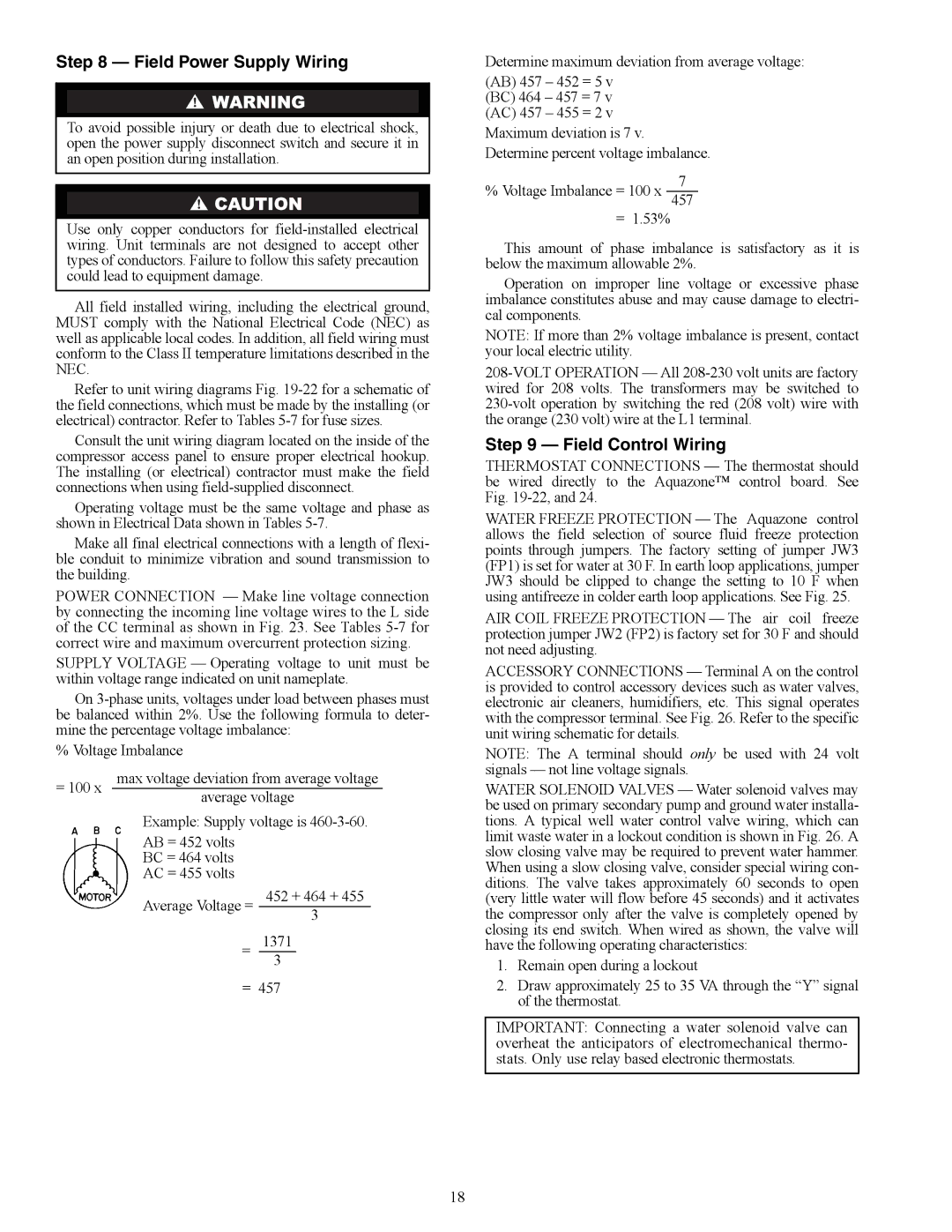
Step 8 — Field Power Supply Wiring
To avoid possible injury or death due to electrical shock, open the power supply disconnect switch and secure it in an open position during installation.
Use only copper conductors for
All field installed wiring, including the electrical ground, MUST comply with the National Electrical Code (NEC) as well as applicable local codes. In addition, all field wiring must conform to the Class II temperature limitations described in the NEC.
Refer to unit wiring diagrams Fig.
Consult the unit wiring diagram located on the inside of the compressor access panel to ensure proper electrical hookup. The installing (or electrical) contractor must make the field connections when using
Operating voltage must be the same voltage and phase as shown in Electrical Data shown in Tables
Make all final electrical connections with a length of flexi- ble conduit to minimize vibration and sound transmission to the building.
POWER CONNECTION — Make line voltage connection by connecting the incoming line voltage wires to the L side of the CC terminal as shown in Fig. 23. See Tables
SUPPLY VOLTAGE — Operating voltage to unit must be within voltage range indicated on unit nameplate.
On
% Voltage Imbalance
= 100 x | max voltage deviation from average voltage | ||
| average voltage | ||
| Example: Supply voltage is | ||
| AB = 452 volts |
|
|
| BC = 464 volts |
|
|
| AC = 455 volts |
|
|
| Average Voltage = | 452 + 464 + 455 |
|
| 3 |
| |
|
|
| |
| = | 1371 |
|
|
| 3 |
|
= 457
Determine maximum deviation from average voltage:
(AB) 457 – 452 = 5 v (BC) 464 – 457 = 7 v (AC) 457 – 455 = 2 v
Maximum deviation is 7 v. Determine percent voltage imbalance.
% Voltage Imbalance = | 100 x |
| 7 |
| 457 | ||
= | 1.53% |
| |
This amount of phase imbalance is satisfactory as it is below the maximum allowable 2%.
Operation on improper line voltage or excessive phase imbalance constitutes abuse and may cause damage to electri- cal components.
NOTE: If more than 2% voltage imbalance is present, contact your local electric utility.
Step 9 — Field Control Wiring
THERMOSTAT CONNECTIONS — The thermostat should be wired directly to the Aquazone™ control board. See Fig.
WATER FREEZE PROTECTION — The Aquazone control allows the field selection of source fluid freeze protection points through jumpers. The factory setting of jumper JW3 (FP1) is set for water at 30 F. In earth loop applications, jumper JW3 should be clipped to change the setting to 10 F when using antifreeze in colder earth loop applications. See Fig. 25.
AIR COIL FREEZE PROTECTION — The air coil freeze protection jumper JW2 (FP2) is factory set for 30 F and should not need adjusting.
ACCESSORY CONNECTIONS — Terminal A on the control is provided to control accessory devices such as water valves, electronic air cleaners, humidifiers, etc. This signal operates with the compressor terminal. See Fig. 26. Refer to the specific unit wiring schematic for details.
NOTE: The A terminal should only be used with 24 volt signals — not line voltage signals.
WATER SOLENOID VALVES — Water solenoid valves may be used on primary secondary pump and ground water installa- tions. A typical well water control valve wiring, which can limit waste water in a lockout condition is shown in Fig. 26. A slow closing valve may be required to prevent water hammer. When using a slow closing valve, consider special wiring con- ditions. The valve takes approximately 60 seconds to open (very little water will flow before 45 seconds) and it activates the compressor only after the valve is completely opened by closing its end switch. When wired as shown, the valve will have the following operating characteristics:
1.Remain open during a lockout
2.Draw approximately 25 to 35 VA through the “Y” signal of the thermostat.
IMPORTANT: Connecting a water solenoid valve can overheat the anticipators of electromechanical thermo- stats. Only use relay based electronic thermostats.
18
